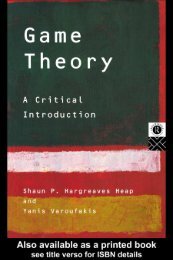handbook-executive-leadership-of-research-development-pdf-v10
handbook-executive-leadership-of-research-development-pdf-v10
handbook-executive-leadership-of-research-development-pdf-v10
You also want an ePaper? Increase the reach of your titles
YUMPU automatically turns print PDFs into web optimized ePapers that Google loves.
BUILDING ON STRENGTHSUniversity <strong>of</strong> WollongongThe University <strong>of</strong> Wollongong is widely acknowledged as an agile and opportunistic<strong>research</strong>-active institution with a strong regional identity. The senior <strong>executive</strong> leadershave considerable credibility in <strong>research</strong> <strong>development</strong>, particularly since they arewell connected with external bodies. The University succeeded in its various phases<strong>of</strong> <strong>development</strong> as a regional university with national and international aspirations,by agreeing that it could not be all things to all people. It had to concentrate on itsstrengths from the outset. It has consistently worked from clear organisational goalsthat emphasise <strong>research</strong>, led by academics with strong track records in <strong>research</strong> whohave taken a highly participative approach to <strong>leadership</strong>.Wollongong has developed a culture <strong>of</strong> both academic and general staff workingtogether for the collective good. A mentoring program advises new academics ontheir <strong>research</strong> activities, socialises them into the departmental culture and connectsthem with relevant <strong>research</strong> bodies. Collaborative processes get academics workingtogether, help them find new avenues for <strong>research</strong>, stimulate their interest, andnurture pr<strong>of</strong>essional networks to advance their careers.Historically, the University has taken a risk on young staff with a clear messagethat they could get ahead at Wollongong by paying attention to <strong>research</strong>. TheEarly Career Researchers (ECRs) program has been a key initiative. The year longprogram aims to develop the confidence <strong>of</strong> the ECRs to deal with critical challengesthey face. Distinctive features <strong>of</strong> the approach include cross-faculty mentoringwhich has the advantage <strong>of</strong> broadening the base <strong>of</strong> support for <strong>research</strong>, teachingand community engagement, free from the priorities and issues <strong>of</strong> the participant’sacademic department. In addition to developing the skills, knowledge and capacitiesnecessary for a successful <strong>research</strong> and academic career, mentoring by academicsoutside the department opens up new opportunities for developing networks andinterdisciplinary collaborations with colleagues in other parts <strong>of</strong> the Universityand beyond.Wollongong has recently moved to rapidly step up its <strong>research</strong> pr<strong>of</strong>ile with apackage <strong>of</strong> refreshment and reform across the University. The process involved atypically consultative approach led by the Vice-Chancellor, including a town meeting,working group <strong>of</strong> key <strong>research</strong>ers, discussion papers and a consultation paper.Focus 4 — Developing a <strong>research</strong>-oriented workforce77



